STILL BANGING FOR THE BUCKS
The incredibly basic concept behind Stomp, a phenom now in its third decade, remains: “Make a rhythm out of anything we can get our hands on that makes a sound.” (Luke Cresswell, co-founder/director). The result: four global productions, including permanent venues in New York and London’”and the rousing tour now playing the Broadway Playhouse at Water Tower Place.
The detonations of joy that make Stomp crash and bang both delight and deafen audiences with beats that rival your heart’s and pulsation that, whether from thumped cigarette packs, human chests, clashing garbage lids, or industrial drums, slowly feels universal and non-negotiable. If for one morbid minute you might measure an entertainment by its D.F.D. (distance from death), Stomp is as alive as it gets or a crowd can process.
In a non-stop 105 minutes, the eight “stompers”’”six guys and two gals–combine self-made percussion sections, inevitable and irresistible movement given the rhythms, and sight gags galore. (It’s not all lockstep uniformity; the players’ differences surface along with the awesome simultaneity of metallic music.)
Like the break-dancing of the 80s, the source for Stomp can still be found on street stoops and back alleys all over our inner cities. The 1995 origin was street performances in the U.K.: Youth, with energy to burn and boredom to improvise, turned found objects into sound objects. Household goods or industrial discards–it’s all grist for the Stomp mill (and the stuff changes with the show)–eight Zippo lighters clicking in unison like candles in the wind, synchronized stiff-bristle brooms, or wooden staffs suggesting medieval combat.
It’s all about implements, not instruments. Indeed, the only percussion makers not used are traditional ones–snare or kettle drums, xylophones, chimes or cymbals. Here the preferred mode requires nothing less than hub caps, inner tubes, newspapers (here proclaiming the Cubs’ World Series win), tea chests, dustbins, mops, radiator hoses, supermarket carts, plumbing pipes, paint cans, kitchen sinks, basketballs, boots, juggling cans, or just slap-happy clapping. No melodies connect non-existent notes, but the rhythmic variations are surprisingly complex as well as contagious.
It’s a triumph of blue-collar resourcefulness, this ability to turn objects into sounds, sounds into rhythms, and rhythms into galvanic excitement to the last row of a packed house. It’s like O.C.D. or A.D.D. put to good use. Even anger that might go into guns is turned into a ritualistic rivalry.
Plus throughout the romp of Stomp’”and particularly at the end’”opportunities abound for the audience to test their hand-eye coordination to the max, both in volume and rhythm. You can’t fight the beat anyway: Trying to match the stompers’ percussive patterns tells you just how much practice went into the feats of their feet and the discipline of so much organized noise.
Interestingly, however frenetic the performers’ hands and feet, their faces remain impassive, like Irish step-dancers who seem to force every ounce of energy and concentration right down their legs and into their feet. It’s as if they don’t want to show how much fun they’re having. That’s our job and we couldn’t want it more.
photos by Steve McNicholas
Stomp
national tour
Broadway Playhouse, Water Tower Place, 175 E. Chestnut in Chicago
for tickets, visit Broadway In Chicago
TOUR CONTINUES IN AN OPEN RUN
for more info and tour dates, visit Stomp
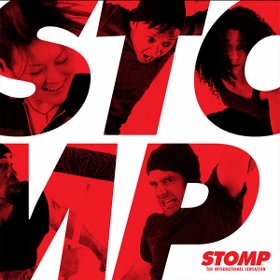

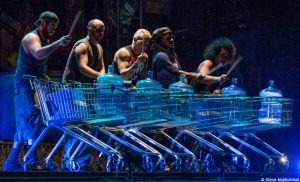
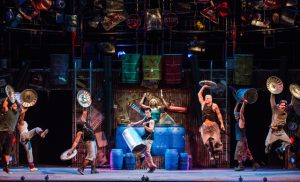
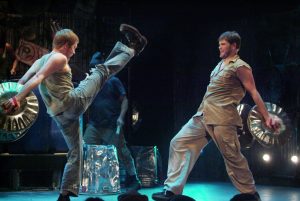
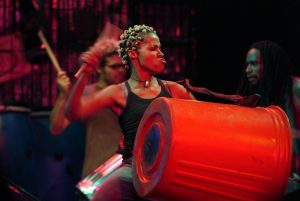
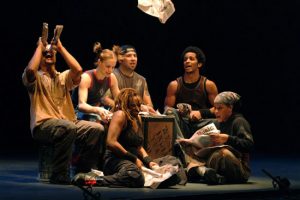

{ 1 comment… read it below or add one }
Thanks, Larry. When I saw it in NYC two decades ago, the performers were not impassive, and that is the important difference. Glad you caught it.